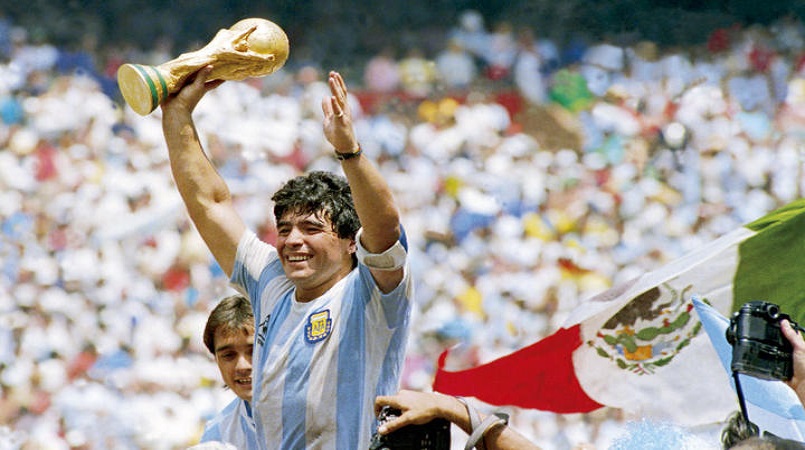
Diego Maradona, one of the greatest footballers in history, has died at the age of 60.
Maradona's lawyer revealed that the Argentine, who had recently battled health issues and underwent emergency surgery for a subdural haematoma several weeks ago, had suffered a heart attack at his home in the outskirts of Buenos Aires on Wednesday.
Such was Maradona's legendary status in his homeland that Argentine President Alberto Fernandez declared three days of national mourning after the news of Maradona's death.
The AFA said on Twitter: "The Argentine Football Association, through its President Claudio Tapia, expresses its deepest sorrow for the death of our legend, Diego Armando Maradona. You will always be in our hearts."
Maradona is widely regarded as one of the greatest - if not the greatest - footballers of all time and was the inspiration for Argentina's World Cup success in Mexico in 1986.
He also led the country to the final of the 1990 tournament in Italy and managed them in South Africa in 2010.
Maradona's successes made him a global star and a national hero in Argentina but his career was also blighted by controversies on and off the field.
His 'Hand of God" goal against England in the 1986 World Cup quarter-finals, when he pushed the ball into the net with his hand, earned him infamy - although he followed up by scoring the "goal of the century", a remarkable solo effort, in the very same game.
His international playing career ended in shame when he failed a drug test at the 1994 World Cup in the United States and he was notorious for a wayward lifestyle throughout his life.
He was also banned from football in 1991 after testing positive for cocaine while playing for Napoli.
However, he remained a revered figure at the Italian club, where he won two Serie A titles.
He also played for Barcelona, Sevilla, Boca Juniors and Newell's Old Boys and was most recently manager of Gimnasia y Esgrima in La Plata, Argentina.
While Maradona was often considered the greatest player of all-time, his old Brazilian rival for that accolade Pele said on Wednesday that it was "sad to lose friends this way".
"Certainly, one day we'll kick a ball together in the sky above," added Pele.
Football superstar Lionel Messi paid tribute to his compatriot: "A very sad day for all Argentinians and for football. He leaves us, but he is not gone because Diego is eternal. I stay with all the beautiful moments I lived with him and I wanted to send my condolences to his family and friends."
Juventus star Cristiano Ronaldo wrote on Instagram: "Today I say goodbye to a friend and the world says goodbye to an eternal genius. One of the best of our times. An unparalleled magician. He leaves a legacy without limits and a void that will never be filled. "
Tottenham manager Jose Mourinho wrote "Don Diego... damn dude I miss you."
England's Gary Lineker, who played against Maradona in the 'Hand of God' game, tweeted: "By some distance the best player of my generation and arguably the greatest of all time. After a blessed but troubled life, hopefully he'll finally find some comfort in the hands of God...RipDiego."
Born on 30 October 1960 in the Buenos Aires working class suburb of Lanus, the fifth of eight children of a factory worker, Maradona grew up in the Villa Fiorito shanty town.
His mother Dalma, known to his fans as "Dona Tota", saw a star reflected on the floor in the church where her son was baptised and imagined a bright future as an accountant.
But Maradona's love affair with soccer was apparent from the start. Given his first football as an infant, he slept with it under his arm.
Discovered in street kickabouts by the scout for first division club Argentinos Juniors, the prodigy made his league debut at 15.
At 17 he just missed inclusion in Argentina's 1978 World Cup-winning squad at home. In the 1982 tournament in Spain, a sending-off against Brazil was a fitting prologue to two unhappy seasons at Barcelona, marred by hepatitis and injury.
But then came liberation, and triumph. In 1984, he moved to Napoli for a then world-record $7.5 million contract. Maradona helped underdogs Napoli to the Italian title twice - creating a whole new set of adoring fans in the process.
And, after the 1986 World Cup triumph in Mexico, he also coached a mediocre Argentine team to a second successive World Cup final in Rome in 1990.
But by 1991, drugs and alcohol began taking over his life.
That year Maradona was handed a 15-month suspension from football worldwide for doping and was called to trial in Naples over alleged links with a vice ring.
He was banned again for 15 months after testing positive for drugs at the 1994 World Cup in the United States.
The compact, 1.65m player with dark curly hair and a pugnacious set to his jaw surrounded himself with an entourage of yes-men and became known for his sharp-tongued confrontations with reporters and critics.
